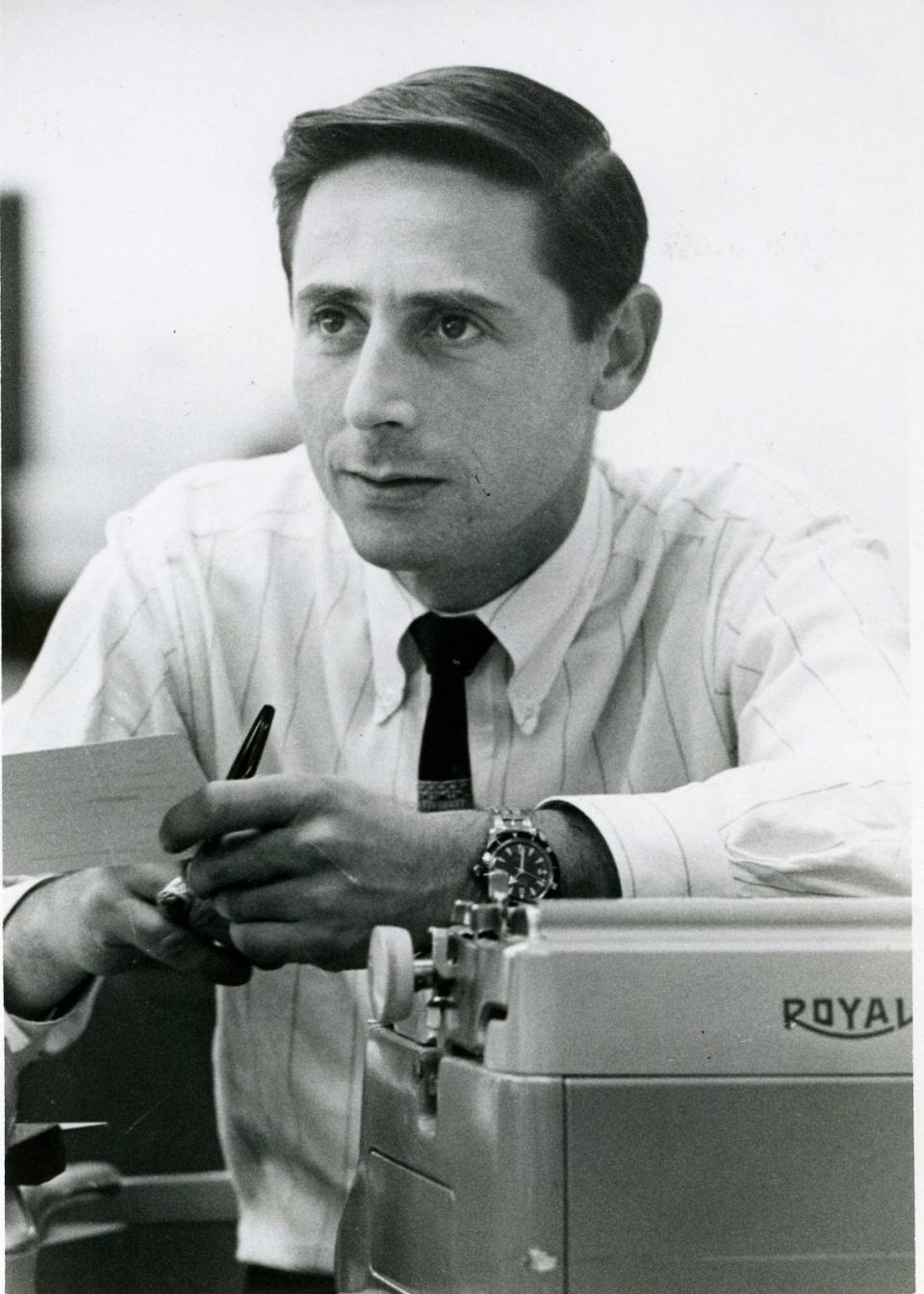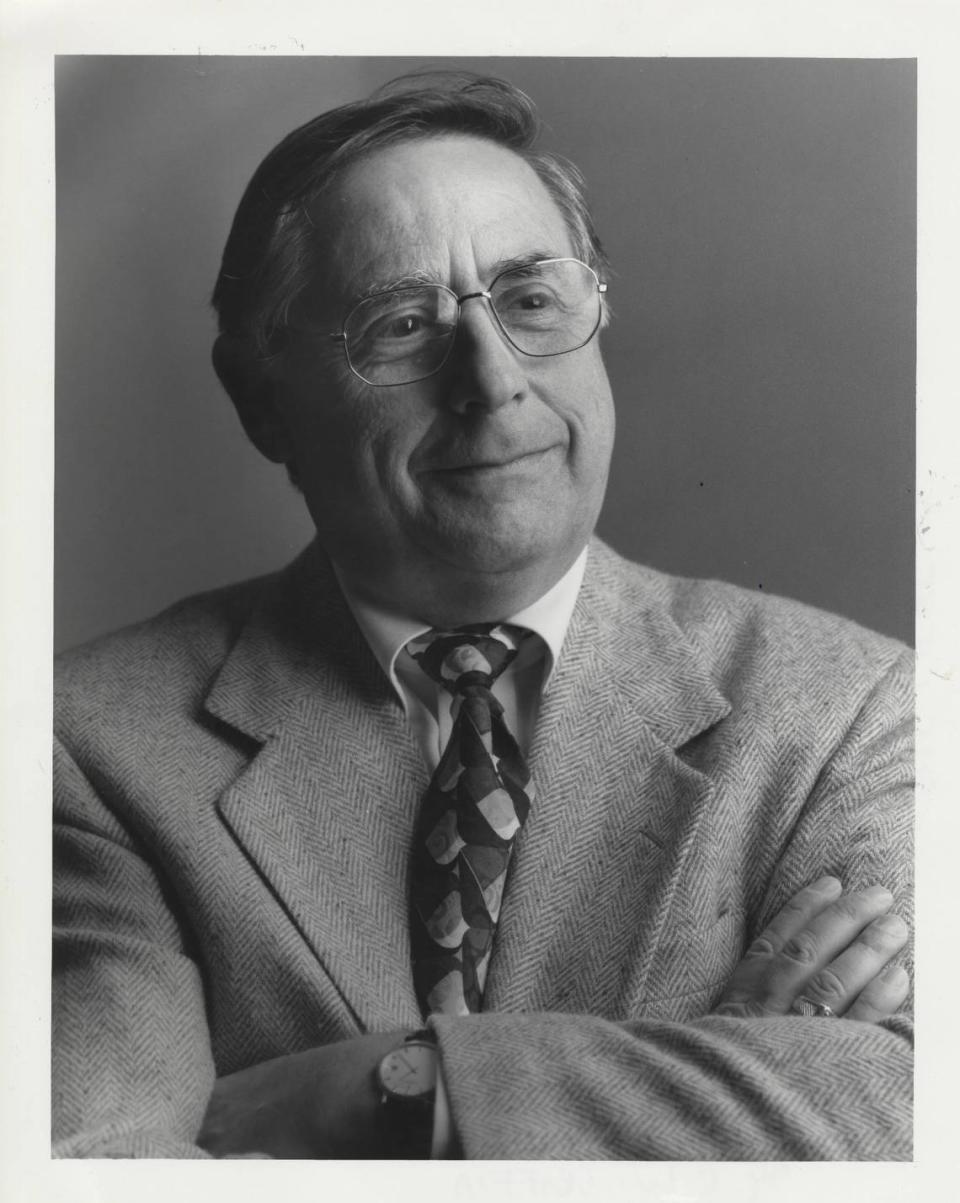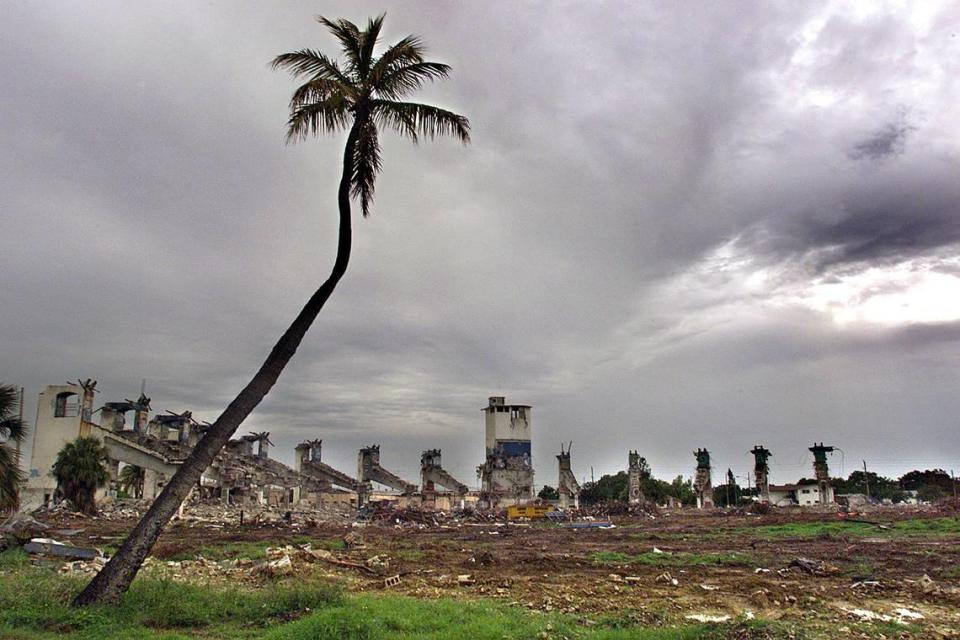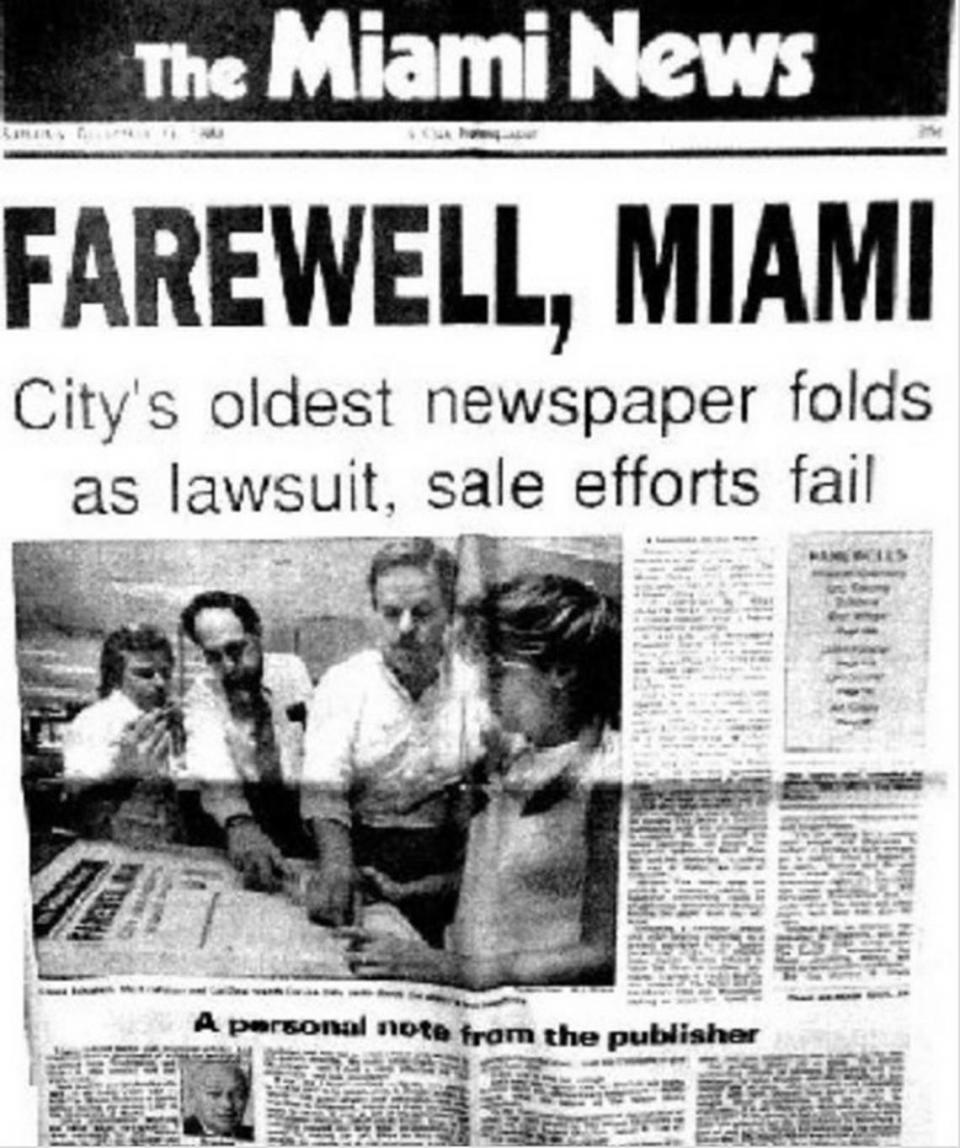Columnist wrote Miami’s history for half a century. But family fueled Howard Kleinberg
- Oops!Something went wrong.Please try again later.
Howard Kleinberg was 16 when he and his family made their way to Miami in 1949.
Like many Jewish New Yorkers of the time, they came seeking a new life, found the colorful local flavor appealing, and the weather was pretty good.
Kleinberg, however, was a teenager — with all that that entails.
If Kleinberg arrived in Miami “as a surly teenager,” as his son Eliot Kleinberg quipped in a family obituary he sent to the Miami Herald, “it took him just days to fall in love with it. He became one of the great chroniclers of his adopted home.”
Author, columnist, editor and historian Howard Kleinberg died Thursday morning, Sept. 14, at his home in Weston, his son said. He was 90.
Why Kleinberg loved Miami

“Perhaps Dad loved Miami so much because, like most, he came to it. Not willingly at first, of course,” Eliot Kleinberg, a fellow historian and author, told the Miami Herald — one of the publications for which his Dad in his later years wrote a local history column.
“I suspect he realized that Miami, like America, was great because it was a salad bowl of people from everywhere, speaking different languages, cooking different foods, going to different places to pray. He loved that it wasn’t boring,” Kleinberg’s son said.
Kleinberg, from 1955 when he joined the The Miami News daily newspaper as a sports writer, to the publication of his local history book, “The Mad Genius: Biography of Earnie Seiler and the Orange Bowl Stadium,” in 2017, ensured that no one who read him would find his beloved South Florida boring.
Capturing history
Kleinberg spent four decades at The Miami News, rising to executive editor of the daily newspaper. He helped document President John F. Kennedy’s assassination in 1963, and the 1980 Mariel Boatlift and Arthur McDuffie race riots in Miami, for its pages. He’d also detail the paper’s demise in its 92nd year in 1988 — and for years after elsewhere.
The Miami News was the area’s venerable afternoon newspaper and rival of the Herald, though both shared a building and maintained separate newsrooms overlooking Biscayne Bay.
Heather Dewar, a journalist who worked under Kleinberg at The Miami News and then joined the Miami Herald after the News folded, posted her memories of her former boss on Facebook.
“At a time when most newspaper people were giving up on evening newspapers like The News, Howard collected talented, hardworking, eccentric people and molded them into a staff that was competitive, smart, and creative, with high professional standards, a crazy love of chasing the news, a sincere desire to serve readers, and the kindness to teach young greenhorns how it’s done. His newsroom punched way above its weight. Because of Howard, The Miami News newsroom was a glorious anachronism. Because of what he created there, I found a place in the working world where I belonged, and a profession that I loved,” Dewar wrote.
And from inside that long-gone 1 Herald Plaza landmark, as well as at offices inside downtown Miami’s Freedom Tower years before that in the 1950s and early 1960s, Kleinberg produced a trove of historical articles. His work included hundreds of columns for The News and later the Herald, as well as nine Miami history books, said his son Eliot.
Eliot Kleinberg would follow his father into newspapers. He’s since retired as a news and features reporter for The Palm Beach Post and is the author of more than 10 Florida history books, including two volumes of “Weird Florida” and “Wicked Palm Beach: Lifestyles of the Rich and Heinous.”
Love of journalism

“Dad wasn’t the preaching type about the importance of journalism, and getting the facts straight, and being fair. Except he was. He just didn’t make it sound like preaching. Just the right thing to do,” Eliot said.
“As far back as I can remember, journalism was part of our family’s life,” he continued. “I never saw my dad as a celebrity. Just someone who was very good at his job and well respected by his peers. When I was growing up, his colleagues were no older than my colleagues would be during my journalism career. But to a kid, they were old men. And journalism was something magic. I’ve done hours of oral history with my dad. He probably had more stories than I do. His stories, of course, sound cooler.”
Preserving Florida history
Over the years, the senior Kleinberg became an expert source and protector of Miami history in a region in which history is often overlooked and paradise is paved over, as songwriter Joni Mitchell once prophesied.
“Beyond the glitzy condo towers that were built upon the body and soul of my old Miami, there is concern in my heart that — like the Bronx — all of what was my life-changing city will disappear,” Kleinberg wrote in a 2019 in a self-published memoir.
Kleinberg and HistoryMiami Museum’s resident historian Paul George first bonded over a fish lunch at a restaurant tucked inside the towering old Omni Hotel in downtown Miami a block or so from Kleinberg’s desk inside 1 Herald Plaza in 1979. That chat led to a close friendship as well as Kleinberg’s local history columns in the News and later the Herald.
“He was bringing up all this anecdotal stuff that he had lived through in the Miami of the ‘50s and ‘60s. And you could just see that he loved it. You know that thick New York accent? It didn’t matter. He really embraced Miami,” George told the Herald.
Kleinberg, along with George, realized that historical “voice” needed amplification and to be understood by a growing Miami populace. George hosts educational walking tours through Miami neighborhoods. Kleinberg had thousands of readers’ attention in the region’s dominant newspapers via his columns.
“As we become a bigger and bigger immigrant area, we just need to know our history more,” George said. “So I’m always out there proselytizing and Howard, for many years, got that out in his column. He wrote some books and he did a great job. He was terrific.”
At Miami Senior High
Born in the Bronx in New York in October 1932, to Ben and Ruth Kleinberg, Kleinberg was 16 in February 1949, when his father took him to Miami Senior High on the morning after he arrived in his new home.
“(Dean of Boys) Mr. Coppock asked me what no other guidance counselor ever asked me. ‘What do you want to be in life? What is your favorite thing to do?’” Kleinberg once wrote. “I thought for the instant it took for Jackie Robinson to steal home plate. ‘I’d like to be a writer,’ I told him, adding that I had been somewhat successful at it in junior high school. He made note.”
By the end of his first year at Miami High, Kleinberg was the sports editor of the school paper and had started freelancing at the Miami News.
Love of sports — and a tree

Kleinberg would later become a charter season ticket holder for the Miami Dolphins, served on the Orange Bowl Committee, and followed all the South Florida sports teams, including the University of Miami Hurricanes and would one day teach there at its Coral Gables campus.
Kleinberg loved the now long-gone sports venues — the Orange Bowl, the Bobby Maduro-Miami Baseball Stadium, among them. But in what appears to be the final column he had published in the Miami Herald on July 9, 2001, he lamented a particular amenity.
Each Tuesday, for the past five or six weeks, I have made it my mission to drive to what used to be Miami’s once-splendid Bobby Maduro-Miami Baseball Stadium. It was allowed over the years to decompose through municipal neglect and now is being formally demolished to make room for a housing project.
I have gone not so much to see how the demolition is progressing but to assure myself that the coconut tree just beyond the right-field foul line still is standing.
I’ve had a love affair with that tree, and I want everyone to keep hands off!
Reference books
Soon after graduation, Kleinberg met a fellow high school stringer and the two would help chart Miami’s course for decades. Stuart Blumberg, a couple years younger, was across the causeway at the time, Miami Beach Senior High, when they met in 1953.
“Howard was just one hell of a newsman,” Blumberg said Thursday.
Blumberg retired as president of the Greater Miami and the Beaches Hotel Association and helped spearhead development of the Adrienne Arsht Center for the Performing Arts in the 1990s. In 1989, he also commissioned Kleinberg to write “Miami Beach: A History,” and called the resulting work, “a great reference book.” In 2005, Kleinberg published “Woggles and Cheese Holes: The History of Miami Beach’s Hotels” in which Blumberg figured.
Paul George reviewed “Miami Beach: A History” for the academic journal, Florida Historical Quarterly. “I was impressed by his research and his narrative,” George said.
Kleinberg turned to preservationist and fellow historian Arva Moore Parks and asked her to serve as editor of “Miami Beach: A History.” In 2013, the pair collaborated again on “Legendary Locals of Greater Miami.”
They both laughed in an interview with the Miami Herald upon its publication that they remained friends after “batting heads” over who should make it into the “Legendary Locals of Greater Miami” book and who should not.
“The first list had several hundred names, and then we had to start paring down,” Kleinberg had told the Herald. “We had to compromise, and Arva and I have been friends for years so you choose your battles.”
A Miami wedding
Soon after high school, Kleinberg met Natalie Bernstein at a youth dance — “both insisted the other was in charge,” their son Eliot said. The couple married on Feb. 22, 1953, exactly four years after Kleinberg’s arrival in Miami.
Three days before the wedding, Kleinberg got his draft notice. Despite being in the Marine Reserves, he ended up an Army private and was sent to El Paso, Texas. He was days from being shipped to Korea when the armistice was signed, his son wrote in an obituary he sent to the Herald.
Folding The Miami News

In 1955, Kleinberg, with a growing family, returned to Miami and The Miami News. He started as a sports editor and soon moved to the copy desk and was the News’ executive editor when the paper had the unenviable distinction of publishing its own obituary in its final edition.
“As the last stories were sent down to the composing room, and some sort of commemorative cake was unveiled in the newsroom, I gathered my belongings, walked past the cake and out of the place — and went home. Nothing to celebrate,” Kleinberg said in one of his memoirs.
Two years to the day later he wrote a column for the Miami Herald and revisited that day — from the same tan six-story office building on the bay where he earlier snubbed the farewell cake.
“If all the people who have told me that they miss The Miami News actually had subscribed to it, and if the business people who told me that they miss the paper had bought ads in it, I would not be writing a column-in-exile today for The Miami Herald,” Kleinberg wrote for the Herald on Dec. 31, 1990. “But they didn’t, and I am.”
His columns published in the Herald until the early 2000s.
“Howard was a great newspaperman because he was forever curious, searching, resilient, resourceful, smart and clever,” said Lou Salome, the editorial page editor for the last ten years of The Miami News’ life.
“He watched a newspaper shut down under him and watched in recent years as local newspapers began to vanish. The day he died, a local newspaper was delivered to him,” his son Eliot said. It was one Kleinberg knew from the inside out: the Miami Herald, his son said.
Kleinberg’s fondest role
“The lack of an explicit work week gave Natalie and I an opportunity to continue our goal of seeking out the world,” Kleinberg had said of the couple’s travels to 83 countries.
Kleinberg’s enduring work as a chronicler of Miami history may only be surpassed by the family he placed here.
“The one real positive is that Natalie and I have made it through 70 years of marriage, still in love,” Kleinberg once said. “There were ups and downs but mostly ups. It’s been a good run. And what a family we raised!”
Survivors, services
Kleinberg survivors include his wife Natalie; their four children, Linda Kleinberg Landy, Eliot Kleinberg, Eileen Kleinberg Newmark and David Kleinberg; nine grandchildren and four great-grandchildren.
Services will be at 12:30 p.m. Thursday, Sept. 21, at Temple Beth Am, 5950 N. Kendall Dr.

